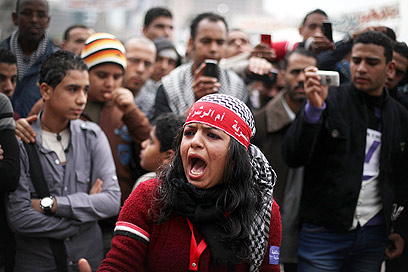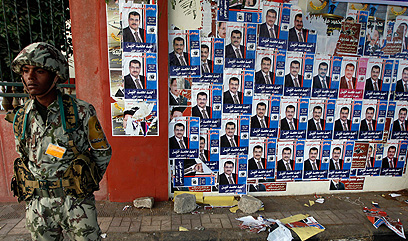
'Peace treaty with Israel won't be revoked'
Senior Egyptian journalist Mounir Mahmoud tells Ynet that Israeli public can be calm; harsh statements on TV only meant to draw public opinion – do not threaten relations with Jewish State
"Israel has no cause for concern – the peace treaty won't be revoked," Egyptian academic and journalist Mounir Mahmoud told Ynet over the phone on Sunday.
"The country is going through its hardest period since the revolution – and I won't be exaggerating if I say – perhaps the hardest period it has known to date," Mahmoud noted.
Related stories:
- Egypt Brotherhood says won't impose Islamic values
- Egypt's unstoppable Islamists PM: Israel facing new security challenges
"We all hoped for a natural and smooth birth toward a true democracy in Egypt, but we were forced to undergo a cesarean section," he said, drawing a comparison between the birth of a newborn and the situation in post-Mubarak Egypt.
"We took our first step toward the creation of a new Egypt and went to the polls. This is the first time we feel as if we are reaping the fruits of our labor after 10 months of agony," he noted.
'Election results not surprising'
Early results from Egypt's first post-revolution election showed Islamist parties sweeping to victory on Saturday, including hard-line Salafists, with secular parties trounced in many areas.
Partial figures trickled in for the areas of the country that voted in record numbers on Monday and Tuesday, confirming earlier predictions that Islamist parties would win at least two-thirds of ballots cast.
Asked about the expected results of the elections, Mahmoud noted that the victory of the Muslim Brotherhood hasn’t surprised the Egyptian public, as it was clear from the get go that they were the most organized party in the country.

Ten months of agony. Protesters in Tahrir Square (Photo: AP)
However, the Egyptian journalist wished to "tell the Israeli public that they can relax. An Islamic government should not bother them, nor the statements their candidates make on TV – these are only meant to draw public opinion due to the elections.
"What is also apparent is that the propaganda from the days of Hosni Mubarak still has its effect on commentators in the United States and Israel, according to which the Muslim Brotherhood will cancel the peace treaty while the Mubarak dictatorship will preserve the relations."
Mahmoud stressed that "the peace treaty will not be canceled," adding that "there is not a single decent man in Egypt that says the post-revolution regime would go back on its bilateral agreements and national obligations."

Soldier outside of polling station (Photo: AP)
Furthermore, Mahmoud added, "The rule of the military establishment has yet to be determined, but it will definitely have a significant part in Egypt's foreign policy decisions, and everything that has to do with war."
Mahmoud also argued that Israeli and Western commentators fail to understand that since Mubarak's ousting, the Muslim Brotherhood has been following the same path as Egypt's Supreme Military Council, and that they cannot afford to get involved in confrontations. This, he said, will also be reflected in the drafting of Egypt's new constitution.
"Most importantly," Mahmoud noted, "Is that the Egyptian people will not allow the Muslim movement to confine the public's lives, because the Egyptian people are different than other religious movements in our region, and have never been similar to those in Iran, Syria, Lebanon and Afghanistan.
"Egypt's moderate nature will not change; the true understanding that we have is that the Muslim faith is a bridge between god and the people, but not a tool to dictate people's way of life – we cannot digest radicalism," he said.
- Receive Ynetnews updates directly to your desktop










